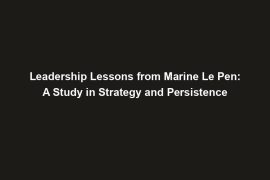Hey there, history buffs and leadership enthusiasts! Today, we’re diving into the fascinating world of one of the most iconic leaders in history – Charles de Gaulle.
Let’s start off with a quick overview of who de Gaulle was and what made his leadership style so remarkable. Known for his visionary approach and strategic thinking, de Gaulle was a key figure in French history, serving as both a military leader and the President of France. His bold decision-making and unwavering determination helped shape the course of both the country and the world during turbulent times.
So, why should we study historical leaders like de Gaulle? Well, there’s a lot we can learn from their successes and failures. By delving into their leadership strategies, we can gain valuable insights that can be applied to our own lives and roles as leaders.
In this blog post, we’ll be exploring the effective leadership strategies that de Gaulle employed during his time in power. From his visionary leadership and resilience to his decisiveness and strategic thinking, there’s a lot we can learn from the way he inspired and motivated those around him.
So, get ready to uncover some valuable lessons from the past that can help shape your future as a leader. Stay tuned for an in-depth look at how de Gaulle’s leadership strategies can be applied in today’s fast-paced and ever-changing world. Let’s dive in!
Visionary Leadership: Setting Ambitious Goals
One of the key leadership strategies employed by Charles de Gaulle was his ability to set ambitious goals that inspired his followers to achieve greatness. De Gaulle had a vision for France that was grand and far-reaching, and he motivated his people to work tirelessly towards realizing that vision.
Think of it like this: de Gaulle was the captain of a ship setting sail towards uncharted waters. Instead of playing it safe and staying close to shore, he boldly charted a course towards new horizons, encouraging his crew to join him on an epic journey of discovery and growth.
Resilience and Determination: Overcoming Obstacles
De Gaulle faced numerous obstacles and setbacks throughout his leadership journey, but what set him apart was his unwavering resilience and determination. Instead of giving up when the going got tough, he dug deep, found inner strength, and forged ahead towards his goals.
Imagine de Gaulle as a marathon runner facing a steep hill towards the end of the race. Instead of slowing down or stopping, he pushed through the pain, drawing on his mental fortitude to cross the finish line triumphantly.
Decisiveness and Courage: Making Tough Calls
One of de Gaulle’s most admirable qualities was his decisiveness and courage in making tough decisions. He didn’t shy away from difficult choices or back down in the face of criticism. Instead, he stood firm in his beliefs and took bold actions that he believed were necessary for the greater good.
Picture de Gaulle as a chess player, carefully considering his moves and strategically positioning his pieces for an eventual checkmate. When it was time to make a daring move, he did so without hesitation, knowing that his courage and conviction would ultimately lead to victory.
Strategic Thinking: Planning for Success
De Gaulle was a master strategist, known for his ability to plan and execute successful military and political strategies. He didn’t just rely on luck or chance to achieve his goals; instead, he carefully mapped out his path to success, considering all possible scenarios and outcomes.
Think of de Gaulle as a general leading his troops into battle. Instead of charging blindly into the fray, he devised a carefully crafted battle plan, taking into account the strengths and weaknesses of both his own forces and the enemy’s. This strategic approach allowed him to outmaneuver his opponents and emerge victorious time and time again.
Implications for Modern Leaders
Now that we’ve delved into the effective leadership strategies of Charles de Gaulle, let’s take a moment to consider how modern leaders can apply these timeless lessons in their own roles. The legacy of de Gaulle offers invaluable insights for anyone looking to inspire, motivate, and lead their teams to success.
Applying de Gaulle’s Leadership Strategies
One key takeaway from de Gaulle’s leadership style is the importance of vision and ambition. Just as de Gaulle set ambitious goals for France, modern leaders can articulate a clear vision for their organizations and inspire their teams to work towards a common objective. By encouraging creativity and innovation, leaders can foster a culture of growth and achievement.
Resilience and determination were also hallmarks of de Gaulle’s leadership. In the face of adversity, he remained steadfast in his commitment to his goals. Modern leaders can learn from his example by staying resilient in the face of challenges and setbacks, and demonstrating unwavering determination in pursuing their vision.
Cultivating a Strong Organizational Culture
Another lesson from de Gaulle’s leadership is the importance of cultivating a strong organizational culture. By fostering a sense of unity, pride, and purpose among employees, leaders can create a positive work environment that encourages collaboration and productivity. De Gaulle’s ability to instill loyalty and commitment in his followers serves as a testament to the power of a strong organizational culture.
However, while implementing de Gaulle’s leadership strategies can be highly effective, modern leaders must also be mindful of potential challenges and pitfalls. It’s crucial to strike a balance between decisiveness and flexibility, and to adapt to changing circumstances while staying true to core values and principles.
Conclusion
In conclusion, the leadership strategies of Charles de Gaulle provide a wealth of valuable lessons for modern leaders. By embracing visionary leadership, resilience, decisiveness, and strategic thinking, leaders can inspire their teams, navigate challenges, and achieve success in today’s complex business environment. As we reflect on de Gaulle’s legacy, let’s remember the enduring importance of effective leadership in driving organizational success.



